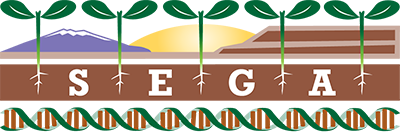You are here
Large Public Interest in Climate Change Research

“It was striking that there was little skepticism about the
fact that climate change is really happening” observed Co-PI of the
Southwestern Experimental Garden Array (SEGA) Dr. Amy Whipple of visitors to the
Babbitt Ranch Expo, held at the Arizona Nordic Village (formerly the Nordic
Center) in early October. And with over 300 people in attendance, it seems that
there’s a healthy public appetite to engage in the environmental research going
on across Babbitt Ranch lands.
“I found there were two kinds of people who came to the SEGA table”, Whipple observed. “We had organic objects like a pine cone, a deer skull and bee nesting boxes, as well as a box of electronics that we call our data ‘WiSARDs’ used to log environmental data out at our field sites”. If someone’s attention immediately went to the WiSARD, then I knew to tell them about the cyber infrastructure and remote data sensing capabilities we have out at our network of highly instrumented field sites. If they grabbed the pine cone, deer skull or looked closely at the bee boxes, I knew to tell them about the plant and animal side of our research, which investigates the effects of climate change on pine trees and other biota, with a particular focus on genetic variation and the genes most adapted changing climate”.
The aim of the Expo was to bring to the public the breadth and excitement of the research being done on Babbitt Ranches. Bonnie Stevens, the event coordinator, observed a steady stream of visitors throughout the day with “people of all ages, including lots of kids and young people”. SEGA personnel chatting with the public about the research included Tom Whitham who spoke about SEGA genetics research, grad student Lindsie McCabe who explained her bees and climate warming work and Kris Haskins (The Aboretum at Flagstaff). According to Stevens the SEGA table and information provided there gave attendees a real feel for the climate change investigations being done in the region – “it was an opportunity for people to spend quality time with scientists and get their detailed questions answered” she says. “People seemed to really like SEGA’s free give away of narrowleaf cottonwood tree saplings too” Stevens continued, “I saw a lot of folks going towards their cars on their way out with a baby tree or two tucked under their arms to take home and plant in their yard”.
Other popular exhibits were fossils ranging from the middle to late Triassic – including ancient horns and dinosaur claws - labeled ‘Please Do Touch’; a demonstration by the Natural Resource Conservation Service (http://www.nrcs.usda.gov/wps/portal/nrcs/site/national/home/) showing the importance of healthy vegetation to anchor soils and conserve water across the region; and an Arizona Game and Fish Dept. exhibit showing the black footed ferret, prairie dog and pronghorn antelope conservation efforts on Babbitt Ranches (https://www.azgfd.com/wildlife/). There was even some live wildlife with a golden eagle and an unusually brightly colored red-tailed hawk brought by the Phoenix-based Liberty Wildlife Rehab Foundation (http://www.libertywildlife.org/).
Tech demonstrations included a prototype Mars Rover brought by a researcher from NASA’s Jet Propulsion Laboratory – who delighted kids by having them lie down and have the remotely controlled vehicle climb them in the same way it would climb over boulders on the surface of Mars. And a drone demonstration by LifeForce Media – which provided people on the ground with a chance to see the images the drone was capturing as it soared over the tree tops.
SEGA’s involvement in the expo is just one example of the
collaboration between SEGA researchers, land managers, state and federal
agencies and continuing active public outreach.
That continuing outreach will
be boosted by Babbitt Ranch’s Nature Discovery Center being put together in a
yurt built for the sole purpose of sharing scientific discoveries, including
those from SEGA, which is expected to open at the Arizona Nordic Village, 15
miles NW of Flagstaff, in spring/summer 2017 (https://www.arizonanordicvillage.com/about-us/).
Additionally, a series of interactive kiosks on SEGA science and climate change is set to open in spring 2017 at The Arboretum at Flagstaff.
Theme by Danetsoft and Danang Probo Sayekti inspired by Maksimer
